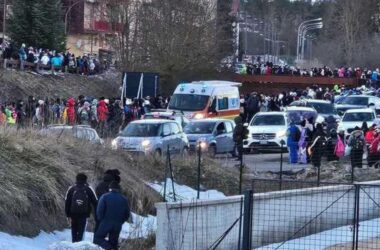Slovak Prime Minister Robert Fico has made it clear—if Ukraine doesn’t restart the transit of Russian gas through its territory, Slovakia will stand in the way of European Union financial aid to Kyiv.
In a fiery statement, Fico slammed Ukrainian President Volodymyr Zelensky, calling him an “enemy” and blaming him for Slovakia’s current energy woes.
Since early 2025, Russian gas has stopped flowing to Slovakia through Ukraine following the expiration of a key transit contract between Russia’s Gazprom and Ukraine’s Naftogaz. While Slovakia still has a long-term agreement with Gazprom until 2034, its ability to receive Russian gas has been thrown into uncertainty.
Fico isn’t taking the disruption lightly. He insists Slovakia must keep buying Russian gas and demands that Ukraine facilitate its transport. His proposed solution? Slovakia should purchase gas directly at the Russian-Ukrainian border and have it moved across Ukraine as Slovak-owned gas.
“We will continue to press Ukraine to fulfill its duty to transport gas,” Fico declared, arguing that Kyiv’s agreement with the EU obligates it to allow transit.
Taking his criticism up a notch, Fico warned of potential retaliation against Ukraine if gas flows don’t resume. He threatened to cut off electricity supplies to Ukraine, restrict support for Ukrainian refugees, and—most significantly—veto EU financial assistance to Kyiv.
“If Ukraine doesn’t restart gas transit, I’ll block financial aid,” Fico told lawmakers, making his position crystal clear.
His comments came as the European Commission acknowledged ongoing negotiations with Ukraine over energy supplies. Fico welcomed this but remained skeptical of alternative gas sources, particularly Zelensky’s suggestion that Ukraine could facilitate gas shipments from Azerbaijan to Europe.
“What else is left for Zelensky to say? He’s talking about Azerbaijani gas, but there’s no concrete project, nothing on the table. He’s just blowing smoke to avoid making tough decisions,” Fico scoffed.
Fico’s criticism of Ukraine’s handling of gas transit isn’t new. He pointed to the 2009 gas crisis when Russian supplies to Slovakia were temporarily cut due to disputes between Moscow and Kyiv. At the time, Fico—then serving his first term as prime minister—condemned Ukraine’s then-PM Yulia Tymoshenko for failing to ensure supply.
Now, with gas flows halted again, Slovakia is relying on reserves stored in its gas tanks. However, Fico insists that resuming transit is the only way forward—not just for Slovakia’s energy needs but for financial stability as well. Slovakia earns transit fees through the company Eustream, partially controlled by Czech businessman Daniel Křetínský’s Energy and Industrial Holding.
With Fico standing firm on his threats, the energy dispute between Slovakia and Ukraine is shaping up to be another major battleground in Europe’s ongoing geopolitical tensions. Whether Kyiv will cave to the pressure or seek alternative solutions remains to be seen.




